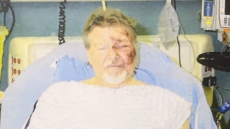VANCOUVER — Dayton Wilson's drug-taking routine ended when he overdosed on heroin laced with fentanyl, but being able to walk and talk normally are also part of his past as he struggles with brain damage from a drug linked to thousands of deaths.
Wilson, 24, used illicit drugs for the last time in August 2016 on Vancouver's Downtown Eastside, according to his mother, but he doesn't remember anything about the day he was taken to hospital.
It was the first of two facilities where he would spend three months learning to take a few steps and utter some words.
The latest figures available from the Public Health Agency of Canada say over 9,000 people fatally overdosed across the country between January 2016 and June 2018. British Columbia's coroners service recorded nearly a third of those deaths.
But there are no comprehensive statistics for people who have survived the brain-damaging effects of opioids. Doctors say that information is imperative to understand the magnitude of the "forgotten" victims of the opioid crisis and to provide them with care and resources so they can become as functional as possible.
More than two years after speech, physical and occupational therapy, Wilson speaks haltingly and is difficult to understand. He paused before responding to a question about what he might recall after he was transported to St. Paul's Hospital in an ambulance.
"I don't remember this, but I wasn't breathing for about five minutes," he said of the length of time his brain is believed to have been deprived of oxygen.
While talking can be frustrating, what he laments most is not being able to rap, one of his passions.
"Balance is kind of hard for me now," he said, adding he sometimes falls backwards and has hit his head.
Wilson said he started experimenting with drugs at age 15 before becoming addicted to heroin two years later. The brain damage he experienced at age 21 has helped him understand the power and life-changing effects of his addiction.
"I really like the person it's made me," he said of his ordeal. "I just don't like what it's done to me."
His mother, Valerie Wilson, said she and her ex-husband had refused to let their son live with them as he continued overdosing at their homes even after treatment as they worried about the effects of his addiction on their other children.
The impact of the final overdose was tough on the family.
"He was trying to eat and it was like watching a severe Parkinson's patient," Wilson said of seeing her son in hospital. "He was shaking and couldn't keep food on his fork."
Wilson said there's little awareness about the consequences of brain injury on those who have survived the opioid crisis.
"One thing I hear a lot is, 'At least you still have him.' A lot of the times, I'm like, 'Well, actually, no, I don't. I have a version of him.' "
She said her son was an ironworker who would walk along steel beams high in the air, and now he doesn't want to go to the edge of a rock on the oceanfront because he might fall.
Wilson's family has tried to find community programs and support groups for him but the only services available are for people dealing with unrelated issues, including stroke affecting older adults, his mother said.
"He wants to be a contributing member of society," she said, adding her son recently got a part-time job as a cleaner at a Kamloops hotel, where he now lives with his father.
"Going to work is important to his self-esteem and now that he has this job, where he's essentially cleaning toilets, he loves it."
Norma McDonald's daughter Tracey McDonald, now 44, was addicted to prescription opioids for decades after a diagnosis of endometriosis when she was 14. She suffered brain damage following her first and only overdose in July 2017.
"The endometriosis was so painful she would literally drop to the floor," McDonald said of her daughter, who started "doctor shopping" for methadone, OxyContin and Percocet, eventually going through addiction treatment at the advice of her family physician.
She relapsed and overdosed, suffering brain damage that has affected her speech and left her dependent on a wheelchair, her mother said.
"When people hear it was caused from a fentanyl overdose then she's pretty much a write-off and that's unfortunate," McDonald said of her daughter, who lives with her parents.
Dr. Adam Peets, a physician in the intensive care unit at St. Paul's Hospital, where Wilson was initially treated, said brain cells can be affected in as little as 30 seconds after someone overdoses and the level of damage can vary from mild to severe.
An estimated 25 to 33 per cent of patients are admitted to ICU because of complications from increasingly stronger drugs such as fentanyl and carfentanil but there is currently no way to adequately collect that information, Peets said.
Electronic health records include a patient's diagnosis at admission, he said.
But some of those people may be diagnosed with shock or something vague in an emergency room and a brain injury would be determined later through later lab tests, which he said are recorded on a separate system.
"It's embarrassing, quite frankly," Peets said of the lack of data on overdose-induced brain injuries, which he would like to see tracked nationally. "It's something that the whole health-care system needs to do a better job on."
Without data, it's impossible to gauge the resources being used in hospitals or how resources in the community could best be utilized, Peets said.
"How can we adjust the way we do business without having the best data to help drive those decisions, like staffing or going to the government and saying, 'Look how many patients are overdosing and having chronic brain injury. We need to do more primary prevention and secondary prevention or fund post-discharge rehab.' "
St. Paul's will be among hospitals in the Vancouver area to roll out a new electronic health records management system in 2019 to better collect data but it won't be streamlined across the province, where multiple systems are being used, he said.
Dr. Patricia Daly, chief medical health officer of Vancouver Coastal Health, called the lack of data on overdose-induced brain injuries "tragic" because neither patients nor their families get the support they need.
"We focus on deaths but we forget that there's another group of people who have been negatively impacted, some of them severely."
Nicholas Gnidziejko, manager of clinical administrative databases operations for the Canadian Institute for Health Information, said national statistics on brain damage related to the overdose crisis would require developing a set of standards to collect the data in a consistent and comprehensive way but there is no such system in any province.


